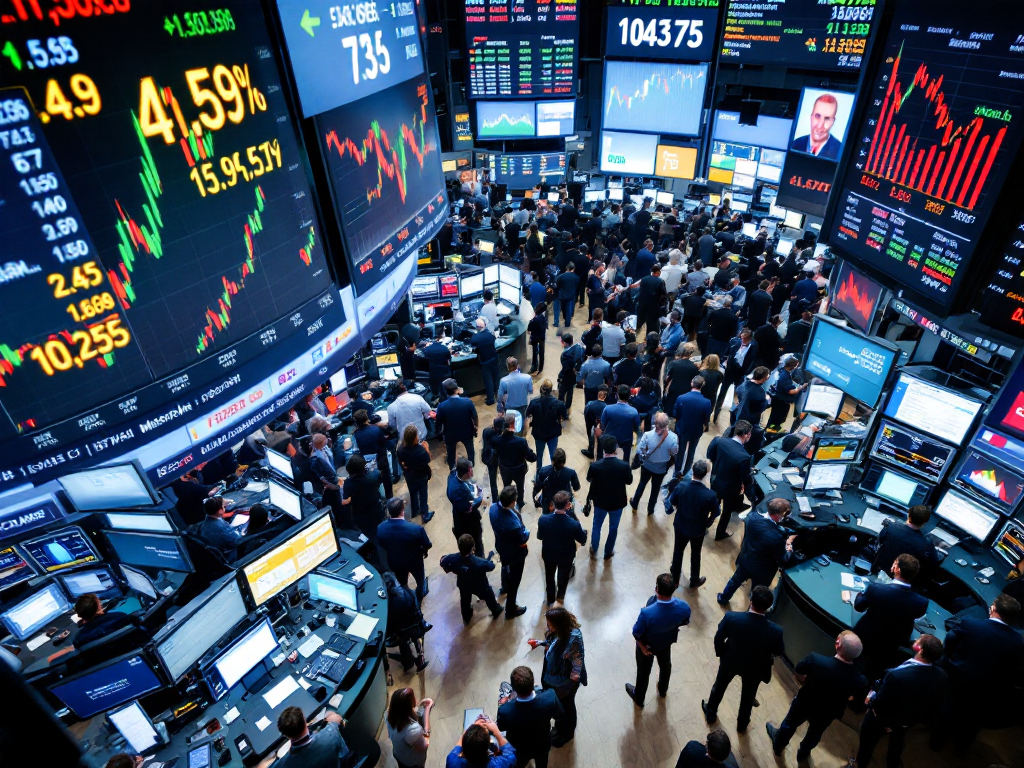U.S. Stocks Suffer Significant Declines Amid Tariff Escalation
The U.S. stock market experienced sharp declines this week, with the S&P 500 Index closing below 5,000 points for the first time in nearly a year, marking one of its steepest four-day losses since its creation in the 1950s. Investors’ dwindling hopes for tariff relief significantly influenced market performance, particularly as the April 9 deadline for increased tariffs loomed closer. Concerns heightened after the White House confirmed that tariffs on China would increase to 145%, escalating the ongoing trade tensions with the world’s second-largest economy.
The Dow Jones Industrial Average and the tech-heavy Nasdaq Composite joined in the plunge, highlighting widespread investor unease. The Dow dropped 320.01 points, a decline of 0.84%, while the Nasdaq Composite shed a substantial 335.35 points, or 2.15%, to close the trading day. The volatility index, a widely monitored indicator of market stress, surged for the fourth consecutive trading day, reaching its highest levels since the onset of the COVID-19 pandemic in March 2020.
“The market is reacting negatively to continued uncertainty around tariffs and their long-term impact,” said financial analyst Rebecca Jarvis. “Anxiety among investors is clearly evident, reflecting concerns that a trade war could severely impact economic growth.”
Amid this escalation, stocks of leading technology firms have experienced severe losses. Tesla, Nvidia, Apple, and Amazon were among the hardest-hit companies, each seeing their share prices drop significantly as investors worry about supply chain impacts and reduced consumer demand.
Tariffs Trigger Wider Market and Economic Repercussions
The recent downturn can be traced back to President Donald Trump’s announcement of sizable tariff hikes against Chinese imports, a decision that has culminated in the S&P 500 losing $5.83 trillion in market capitalization over a mere four days. The tariffs, initially set at 104% and now expanded to 145%, embody escalating economic tensions and fears of global financial instability.
Federal Reserve Bank of Minneapolis President Neel Kashkari signaled that the central bank is unlikely to lower interest rates to cushion any economic shocks from tariffs. Kashkari emphasized that the inflationary impact of tariffs reduces scope for monetary policy intervention, even if economic conditions deteriorate further.
The economic fallout has already become evident among major corporations. Delta Air Lines withdrew its full-year financial projections, citing the tariff-related uncertainty impacting its cost structure and demand forecasting. Walmart and other retailers have similarly expressed concerns, underscoring pervasive corporate uncertainty stemming from U.S.-China trade relations.
“Businesses are struggling to predict costs and consumer behavior amid changing tariff environments,” explained Jamieson Greer, former chief of staff for the U.S. Trade Representative. “It’s creating a very challenging landscape for strategic planning and investment.”
This environment is not limited to high-tech and retail sectors alone. Oil prices have also fallen as the tariffs have stoked fears about diminished global growth prospects. Goldman Sachs analysts have revised their growth forecasts for China downward to 4.0% in 2025 and 3.5% in 2026, a significant step-down from earlier estimates, signaling potential long-term economic repercussions.
Historical Context and Policy Implications
The current trade tensions recall historical episodes where tariff disputes significantly disrupted global economic activity. Notably, the Smoot-Hawley Tariff Act of 1930, which raised U.S. import duties to record levels, is often cited as exacerbating the Great Depression by provoking retaliatory tariffs that crippled international trade.
In the present context, economists worry that prolonged trade hostilities between major economies could similarly lead to severe economic consequences, including recession. The S&P 500’s decline of more than 12% since the tariff hikes’ announcement underlines the immediate and tangible impact such policies can have on investor confidence and economic stability.
“History has repeatedly shown that tariff disputes rarely result in long-term economic benefits,” stated Dr. Martha Klein, an economics professor specializing in international trade. “Instead, they tend to provoke inflation, depress consumer spending, and harm global economic growth.”
From a policy perspective, the escalation of tariffs poses significant challenges not only for economic management but also for international diplomacy. Despite recent diplomatic overtures and negotiations between the U.S. and China, progress has stalled, leaving businesses and investors in a state of uncertainty. Reports indicate nearly 70 countries have petitioned the U.S. for relief from various tariff impacts, reflecting global concern over the U.S.’s aggressive trade stance.
As April 9 approaches, policy analysts and market watchers remain vigilant. The global economic community waits to see if the U.S. administration will revise its stance or continue down its current path, with broad implications for international trade and global economic health in the balance.


